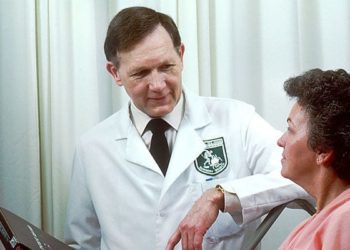Internal medicine interns spending minority of time on direct inpatient care
1. In this direct observational study, first year internal medicine residents (interns) spent only 13% of their time on direct patient care, while spending 43% of their time documenting their work or using the electronic medical record.
2. Time for educational activities was even more infrequent, occupying only 7% of time.
Evidence Rating Level: 2 (Good)
Study Rundown: Since the era of electronic health records, there has been growing concern that resident physicians do not spend as much time on direct patient care as prior generations. In this direct observational study of interns (first year internal medicine residents) on general internal medicine ward rotations at six training programs in the United States, results showed that interns spent only 13% of their time on direct patient care, and of this time, almost a quarter (23%) was spent multitasking on things like medical record review, documentation, or communicating with other members of the care team. Comparatively, interns spent 43% of their day interacting with the medical record or documenting their work. Only 7% of the day included educational activities.
This study provides a valuable baseline of how interns allocate their time on general internal medicine wards. Future studies on how this breakdown affects patient care and resident education and burnout could build off these findings to improve health care delivery as well as physician training. When comparing the direct patient care time today to prior decades, there is not enough adjustment for the increase in the complexity of patient’s medical problems or the that of care delivery. These are difficult to control in observational studies.
Click to read the study in JAMA Internal Medicine
Relevant Reading: How Do Residents Spend Their Shift Time? A Time and Motion Study With a Particular Focus on the Use of Computers
In-Depth [observational study]: This was an observational study using direct time-motion observations of interns (first year internal medicine residents) from 6 mid-Atlantic training programs in the United States while on general internal medicine ward rotations. Data was collected from March 10 – May 3, 2016. All shifts starting on a weekday were included (day shifts, night shifts, and call shifts). Eighty interns were included in this study and data were collected by 23 observers, with 1-2 observers covering the entire intern shift in question. A total of 194 shifts totaling 2173 hours were observed. Time spent by interns was organized into as many of the following categories as applicable: ‘Educational’ (teaching/being taught, educational conferences, reading about medicine), ‘Rounds’ (team rounds in any location), ‘Handoffs’ (transfer of care between interns), or ‘Work’ (any work not included in education/rounds/handoffs), ‘Direct Patient Care’ (included communicating with family), ‘Indirect Patient Care’ (medical record review, viewing other investigations, documentation, communicating with other health care providers), and ‘Miscellaneous’ (non-work related activities like eating, going to the bathroom). Multiple categories could be chosen.
Across a 24 hour period, interns spent 66% of their time on indirect patient care (15.9 hours, standard deviation 0.7 hours). The majority of this time was spent documenting work or using the electronic medical record (10.3 hours, 42.9% of workday). 21% of the day was spent in rounds (5.0 hours, standard deviation 0.6 hours). Direct patient care occupied 13% of the day (3.0 hours, standard deviation 0.1 hours). Educational activities occupied 7% of the day (1.8 hours, standard deviation 0.3 hours). Handoff occupied 3% of the day (0.8 hours, standard deviation 0.2 hours). Of the 3 hours daily spent on direct patient care, approximately 23% (0.7 hours) was spent multitasking on indirect patient care (E.g. documentation).
Image: PD
©2019 2 Minute Medicine, Inc. All rights reserved. No works may be reproduced without expressed written consent from 2 Minute Medicine, Inc. Inquire about licensing here. No article should be construed as medical advice and is not intended as such by the authors or by 2 Minute Medicine, Inc.







![Metformin treats Fragile X syndrome symptoms in mice [PreClinical]](https://www.2minutemedicine.com/wp-content/uploads/2017/07/Metformin_500mg_Tablets-75x75.jpg)

